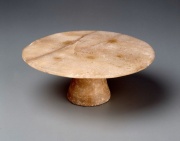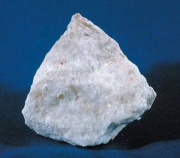Difference between revisions of "Travertine"
(username removed) |
(username removed) |
||
| Line 2: | Line 2: | ||
== Description == | == Description == | ||
| − | A light-colored, porous rock composed primarily of [http://cameo.mfa.org/materials/fullrecord.asp?name=calcite calcite]. Travertine is a variety of [http://cameo.mfa.org/materials/fullrecord.asp?name=limestone limestone] formed from multilayered [http://cameo.mfa.org/materials/fullrecord.asp?name=calcium | + | A light-colored, porous rock composed primarily of [http://cameo.mfa.org/materials/fullrecord.asp?name=calcite calcite]. Travertine is a variety of [http://cameo.mfa.org/materials/fullrecord.asp?name=limestone limestone] formed from multilayered [http://cameo.mfa.org/materials/fullrecord.asp?name=calcium%20carbonate calcium carbonate] deposits in pools by the slow precipitation of mineral-rich spring water. The "holes" characteristic of travertine were produced by trapped [http://cameo.mfa.org/materials/fullrecord.asp?name=carbon%20dioxide carbon dioxide] bubbles during its formation. Plant residues are often layered with the calcite deposits resulting in large elongated, often interconnected rings in the stone. Very porous, spongy travertine is called [http://cameo.mfa.org/materials/fullrecord.asp?name=tufa tufa]. Travertine polishes to a matte finish. It is used as an interior and exterior building material. Thick deposit of travertine occur near Tivoli, Italy, and Mammoth Hot Springs in Yellowstone National Park. Banded travertine from Mexico is called [http://cameo.mfa.org/materials/fullrecord.asp?name=Mexican%20onyx Mexican onyx] marble. |
[[File:Travertineemr1.jpg|thumb|Travertine]] | [[File:Travertineemr1.jpg|thumb|Travertine]] | ||
== Synonyms and Related Terms == | == Synonyms and Related Terms == | ||
| − | tufa limestone; false marble; Mexican onyx; Egyptian alabaster; | + | tufa limestone; false marble; Mexican onyx; Egyptian alabaster; frådsten (Dan.); kildekalk (Dan.); Travertin (Deut, Fr.); travertino (Esp., It.); (Ned.); (Pol.); (Port.); (Sven.); travertijn (Ned.) |
== Hazards and Safety == | == Hazards and Safety == | ||
| Line 22: | Line 22: | ||
== Authority == | == Authority == | ||
| − | * | + | * Luciana and Tiziano Mannoni, ''Marble: the history of a culture'', Facts on File Publications |
| − | * | + | * Anne Grimmer, Glossary of Building Stone Terms, ''A Glossary of Historic Masonry Deterioration Problems and Preservation Treatments'', National Park Service, Washington DC, 1984 |
| − | * | + | * C.W.Chesterman, K.E.Lowe, ''Audubon Society Field Guide to North American Rocks and Minerals'', Alfred A. Knopf, New York, 1979 |
| − | * | + | * G.S.Brady, ''Materials Handbook'', McGraw-Hill Book Co., New York, 1971 Comment: p. 386 |
| − | * | + | * Website address 1 Comment: http://www.marble-institute.com |
* Wikipedia, the free encyclopedia, at http://www.wikipedia.com Comment: http://en.wikipedia.org/wiki/Travertine (Accessed Nov. 9, 2005) | * Wikipedia, the free encyclopedia, at http://www.wikipedia.com Comment: http://en.wikipedia.org/wiki/Travertine (Accessed Nov. 9, 2005) | ||
| − | * | + | * Michael McCann, ''Artist Beware'', Watson-Guptill Publications, New York City, 1979 |
* ''Dictionary of Building Preservation'', Ward Bucher, ed., John Wiley & Sons, Inc., New York City, 1996 | * ''Dictionary of Building Preservation'', Ward Bucher, ed., John Wiley & Sons, Inc., New York City, 1996 | ||
| Line 40: | Line 40: | ||
* ''Van Nostrand's Scientific Encyclopedia'', Douglas M. Considine (ed.), Van Nostrand Reinhold, New York, 1976 | * ''Van Nostrand's Scientific Encyclopedia'', Douglas M. Considine (ed.), Van Nostrand Reinhold, New York, 1976 | ||
| − | * | + | * Random House, ''Webster's Encyclopedic Unabridged Dictionary of the English Language'', Grammercy Book, New York, 1997 |
* ''The American Heritage Dictionary'' or ''Encarta'', via Microsoft Bookshelf 98, Microsoft Corp., 1998 | * ''The American Heritage Dictionary'' or ''Encarta'', via Microsoft Bookshelf 98, Microsoft Corp., 1998 | ||
Revision as of 06:42, 24 July 2013
Description
A light-colored, porous rock composed primarily of calcite. Travertine is a variety of limestone formed from multilayered calcium carbonate deposits in pools by the slow precipitation of mineral-rich spring water. The "holes" characteristic of travertine were produced by trapped carbon dioxide bubbles during its formation. Plant residues are often layered with the calcite deposits resulting in large elongated, often interconnected rings in the stone. Very porous, spongy travertine is called tufa. Travertine polishes to a matte finish. It is used as an interior and exterior building material. Thick deposit of travertine occur near Tivoli, Italy, and Mammoth Hot Springs in Yellowstone National Park. Banded travertine from Mexico is called Mexican onyx marble.
Synonyms and Related Terms
tufa limestone; false marble; Mexican onyx; Egyptian alabaster; frådsten (Dan.); kildekalk (Dan.); Travertin (Deut, Fr.); travertino (Esp., It.); (Ned.); (Pol.); (Port.); (Sven.); travertijn (Ned.)
Hazards and Safety
No significant hazards. Noncombustible.
Additional Images
Authority
- Luciana and Tiziano Mannoni, Marble: the history of a culture, Facts on File Publications
- Anne Grimmer, Glossary of Building Stone Terms, A Glossary of Historic Masonry Deterioration Problems and Preservation Treatments, National Park Service, Washington DC, 1984
- C.W.Chesterman, K.E.Lowe, Audubon Society Field Guide to North American Rocks and Minerals, Alfred A. Knopf, New York, 1979
- G.S.Brady, Materials Handbook, McGraw-Hill Book Co., New York, 1971 Comment: p. 386
- Website address 1 Comment: http://www.marble-institute.com
- Wikipedia, the free encyclopedia, at http://www.wikipedia.com Comment: http://en.wikipedia.org/wiki/Travertine (Accessed Nov. 9, 2005)
- Michael McCann, Artist Beware, Watson-Guptill Publications, New York City, 1979
- Dictionary of Building Preservation, Ward Bucher, ed., John Wiley & Sons, Inc., New York City, 1996
- Van Nostrand's Scientific Encyclopedia, Douglas M. Considine (ed.), Van Nostrand Reinhold, New York, 1976
- Random House, Webster's Encyclopedic Unabridged Dictionary of the English Language, Grammercy Book, New York, 1997
- The American Heritage Dictionary or Encarta, via Microsoft Bookshelf 98, Microsoft Corp., 1998


